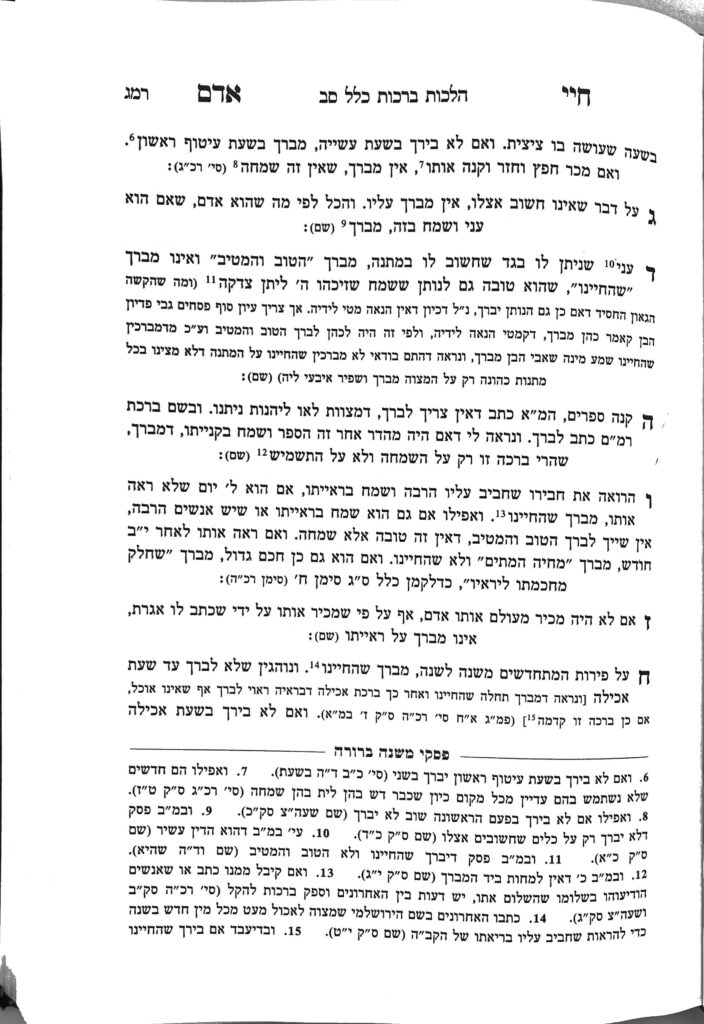We finished siman 5. The Chayei Adam applied the concept of mitzvos lav le’henos nitnu (mitzvos were not given for us to gain material benefit, therefore any perceived material benefit is not halachically considered benefit) to seforim, writing that one does not make a shehecheyanu on acquiring a new sefer. He also brought an opinion, of the Birchas RaMaM, that one does make a bracha.
The word ha’na’ah, in this context, does not mean pleasure, but benefit. Mitzvos have many benefits, but the primary reason why we do mitzvos is because Hashem commanded us to do so. The mitzvah is a vehicle of connection between us and hashem, and the benefits accrued are secondary. A soldier in the army is trained to shoot on command of his commanding officer; thus, the soldier’s body and mind become an extension of his commander. When we do mitzvos due to Hashem’s commandment, we become an extension of Hashem, so to say.
Rabbeinu Avraham Min Hahar, in his commentary to Maseches Nedarim (daf 37), writes that the one exception to the concept of mitzvos lav le’henos nitnu is limud hatorah. When a person learns torah, they absorb the torah specifically through the ha’na’ah the derive from learning. The Iglei Tal writes a similar idea in the introduction to his sefer, and Rav Gifter, zt”l, would mention this exception often. This idea could explain the opinion of the Birchas RaMaM: since one is allowed to derive ha’na’ah from their learning, the acquisition of sefarim is considered ha’na’ah, so one could make a bracha.
Practically, we learned yesterday that due to the machlokes, one should try to exempt themselves through an item which certainly requires a shehecheyanu. If one does not have such an item, they should not recite the bracha, although the Mishnah Berurah writes that if one nevertheless wishes to recite a shehecheyanu, we do not have to stop them.
In siman 6, the Chayei Adam writes that if one sees a friend whom they have not seen in 30 days, they make the bracha shehecheyanu. One does not make hatov vehametiv, even if the feeling is mutual, or even if there are multiple people involved. The Chayei Adam explains that although there is simcha in seeing a friend, there is not tov, so the bracha of hatov vehametiv is appropriate.
The Chayei Adam writes that if it has been 12 months since last seeing the friend, one should make the bracha mechayei meisim (baruch atah . . mechayei meisim).
The Mishnah Berurah points out that these brachos only apply if one had no interface with the friend during the respective time period, because only in such a circumstance is the emotion strong enough to warrant a bracha. If they had any communication, including letters or second-hand regards, they would not make the bracha.
Regarding reciting shehecheyanu for a friend after not seeing them for 30 days, many achronim write that, although the Mishnah Berurah’s reasoning is understandable for the bracha mechayei meisim, it does not explain the minhag to no longer recite the bracha shehecheyanu. They explain that the reason to recite shehecheyanu is not related to having no communication with them, but due to the simcha of seeing them, and the simcha should exist even if the friends were in communication during the time period.
Nevertheless, the minhag has become to refrain from reciting either bracha. The Mishnah Berurah’s explanation is applied to shehecheyanu as well. The Steipler explains that nowadays, one can assume that if a simcha or tzara occurred, they would be informed. Therefore, if they have not heard from their friend, they can assume that all is well.
If one wishes, they may recite the bracha without reciting Hashem’s name.
The Chayei Adam ends the siman with the bracha made on seeing a talmid chochom, asher cholak chochmaso lirei’av.
In siman 7, the Chayei Adam writes that two people have been in touch, but never met, they do not recite the bracha of shehecheyanu upon meeting the first time. Since the bracha requires a cyclical time element (see shiur 1193), and a cycle has not yet been established, no bracha is recited.
Summary
It is a machlokes whether one makes a bracha on acquiring new sefarim. One should try to exempt themselves through an item which certainly requires a shehecheyanu.
If one wishes to recite the bracha nonetheless, the Mishnah Berurah writes that we do not have to stop such a person.
The minhag has become to recite neither shehecheyanu nor mechayei meisim upon seeing a friend after an interval of 30 days or 12 months, respectively.
The bracha upon seeing a talmid chochom is asher cholak chochmaso lirei’av.



